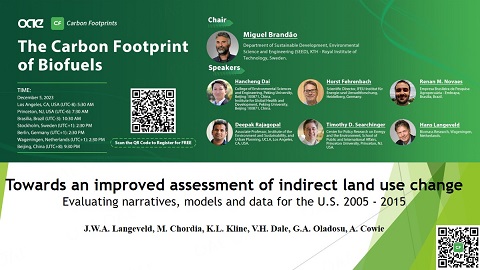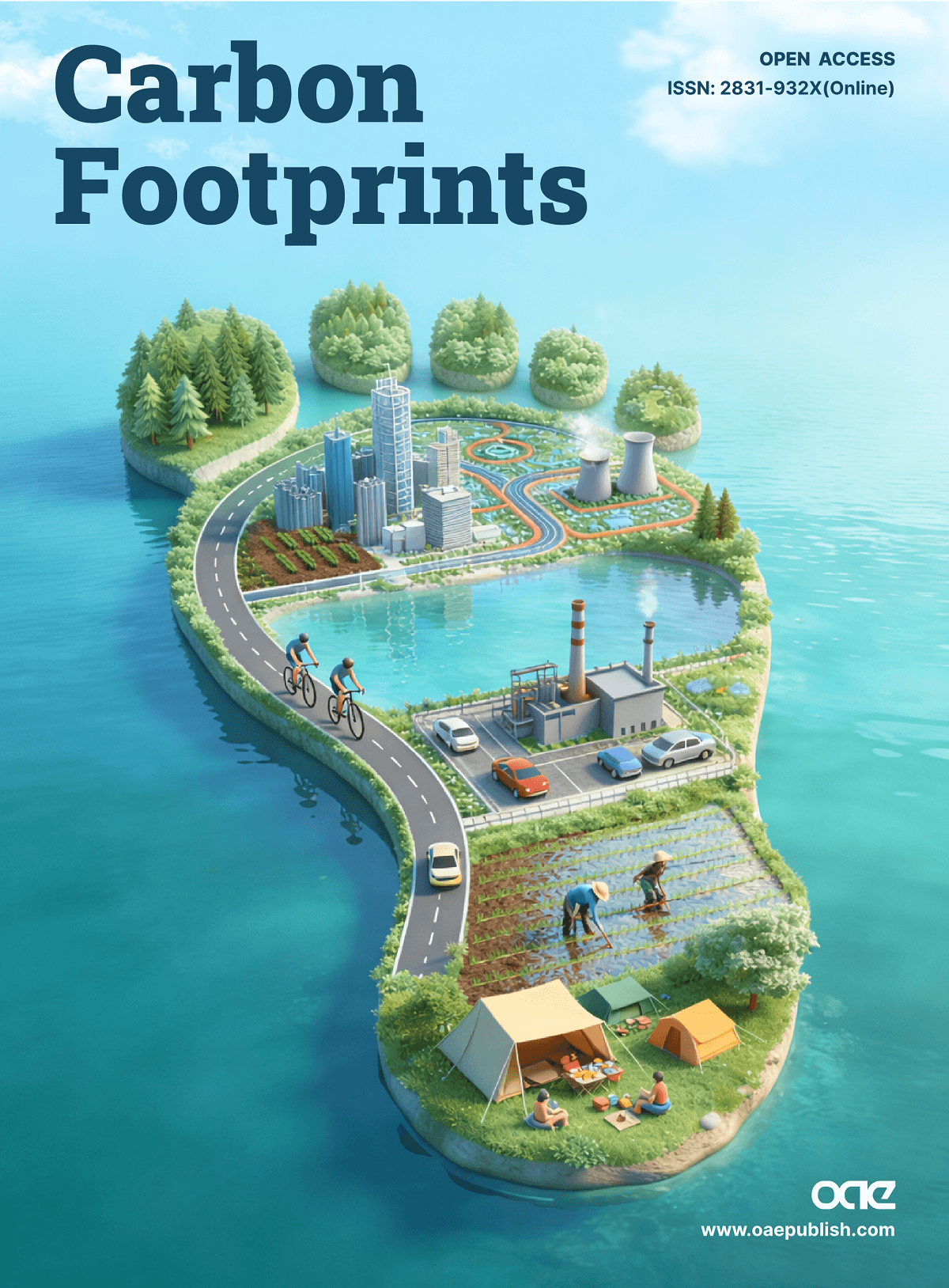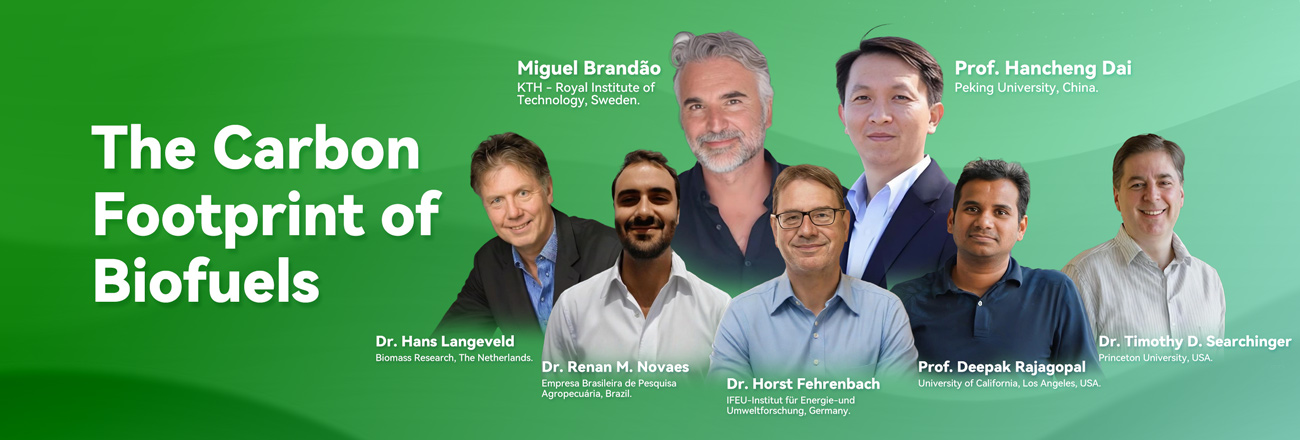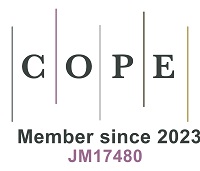Contents
Chair

Miguel Brandão
Department of Sustainable Development, Environmental Science and Engineering (SEED), KTH - Royal Institute of Technology, Sweden.
Speaker(s)

Miguel Brandão
Department of Sustainable Development, Environmental Science and Engineering (SEED), KTH - Royal Institute of Technology, Sweden.
Presentation: Dispelling Misconceptions about the Carbon Footprinting of Biofuels - Uncertainty from Methodological Choices in Modelling Biofuel Systems in LCA
Dr. Miguel Brandão is Associate Professor in Industrial Ecology and Life Cycle Assessment at KTH, Stockholm. Over the last 19 years, he has taught and researched at a number of organizations around the world. He works with the use of hard systems approaches that can robustly support decisions towards sustainable development. His research has focused on the integrated assessment of bio-based systems, with emphasis on their impacts on climate change, resource depletion, ecosystem services and biodiversity. He was/is involved in international standardization initiatives (PAS2050, ILCD, FAO LEAP, ISO, GHG Protocol) in the areas of life cycle assessment, carbon footprinting, circular economy and climate-change metrics. In 2012, he received the SETAC Europe Young Scientist LCA Award.
His interests include Circular Economy, Environmental Economics, Ecological Economics, Agroecology, Land Use, Sustainable Production and Consumption, Globalisation, Poverty alleviation, Food Security, Bioenergy, and Food Systems.

Hancheng Dai
College of Environmental Sciences and Engineering, Peking University, Beijing 100871, China.
Institute for Global Health and Development, Peking University, Beijing 100871, China.
Presentation: Supplying Biomass Energy for China’s 2060 Carbon Neutrality without Threatening Food Security
This study will introduce how China can supply biomass energy on a large scale through optimal allocation of supply and demand in the food market to enhance negative emission potential and help achieve the goal of carbon neutrality. Such scale of bioenergy is produced with limited arable land considering the growing demand for food, without endangering China's food security or increasing the environmental burden on its food trading partners.
Hancheng Dai is an Associate Professor with Tenure of the College of Environmental Sciences and Engineering at Peking University, and director of the Department of Environmental Management. His research focuses on environmental and climate policy assessment and comprehensive decision-making analysis towards green & low-carbon transformation and human & planetary health. He led the development of the IMED model, one of China's representative energy-environment-economic integrated assessment models (IAMs) for policy analysis at the local, national and global scales. He has led nearly 20 national and provincial level scientific research projects. He has published more than 50 papers as the first/corresponding author in SCI journals such as Nature Food and One Earth. He has been listed among the top 2% of highly cited scientists in the world for three consecutive years from 2020 to 2022. He serves as a contributing author of the IPCC Sixth Assessment Report (IPCC AR6) and the lead author of the United Nations Environment Program's Seventh Global Environmental Outlook (UNEP GEO-7). He is also the Standing Committee Member of Branch of Ecological and Environmental Systems Engineering, Systems Engineering Society of China, and Committee Member of Branch of Climate Change of Chinese Society for Sustainable Development.

Horst Fehrenbach
Scientific Director, IFEU-Institut für Energie-und Umweltforschung, Heidelberg, Germany.
Presentation: Calculation of GHG Emissions of Biofuels Following the Rules of RED – Loopholes in Practical Application
Research Topics
Methodology for the sustainability assessment of biomass (energy, material use) Material flow analysis for energy and waste economy systems Advancement of ecological assessment options like conventional Life Cycle Assessment and assessment queries for land use
Professional Memberships and Teaching Activities
Umpire in the DIN NAGUS committee 172-00-10 (Sustainability criteria for biomass)
Member of the DIN NAGUS committee 172-00-03-01 AK (Carbon Footprint of products)
German delegate in the CEN TC 383 (Sustainably produced biomass for energy applications) and ISO PC 248 (Sustainability Criteria for Bioenergy)
Member of IEA Bioenergy task 45 "Climate and sustainability effects of bioenergy within the broader bioeconomy"
Member of the Society of Environmental Toxicology and Chemistry (SETAC)
Chair of the Association for the Promotion of Ecological Agriculture in the Tropics (FÖLT e.V.)
Selected Projects:
Support of the Federal Government in the Global Bioenergy Partnership GBEP (UBA)
Support of the Federal Government in the development of National Biomass Strategy (NABIS)
Sustainability criteria for the material use of biomass under the ‘Blue Angel’ certification system (UBA)
Resource efficiency through cascade use of biomass (UBA)
BioEm–Update of emission factors for bioenergy (UBA)
BioGrace–Harmonisation of GHG emission calculations in Europe (EU)

Renan M. Novaes
Empresa Brasileira de Pesquisa Agropecuária - Embrapa, Brasilia, Brazil.
Presentation: The Importance of Land-use Change in the Carbon Footprint of Sugarcane Ethanol in Brazil
Renan M. Novaes is an R&D analyst at Embrapa, Brazil, working since 2014 with land use change and life cycle assessment associated with agricultural products in the country. He develops data and methods to support environmental accounting databases, studies, and policies. He is the leading author of the BRLUC tool, which provides estimates of land carbon stocks and LUC GHG emissions for Brazil. He has been providing technical support for policies such as the Brazilian Biofuel Policy (RenovaBio), the Brazilian Low Carbon Soybean initiative, the GHG Protocol Land Sector and Removals guidance, the Agricultural Land Sector Roadmap to 1.5ºC and the Carbon Offsetting and Reduction Scheme for International Aviation (CORSIA). He has a multidisciplinary background, with a degree in biological sciences and complementary studies in economics, management, and environmental sciences.

Deepak Rajagopal
Associate Professor, Institute of the Environment and Sustainability, and Urban Planning, UCLA, Los Angeles, CA, USA.
Presentation: Summary of the Pros and Cons of Biofuels
Deepak Rajagopal is a professor at the UCLA Institute of the Environment and Sustainability where he conducts research on life cycle assessment, industrial ecology, energy and agricultural economics and policy. He is also the Director of the Leadership in Sustainability Certificate Program at UCLA. Dr. Rajagopal received his Ph.D in Energy and Resources from UC Berkeley, where he was a researcher at the Energy Biosciences Institute. He holds a M.S. in Agricultural and Resource Economics from UC Berkeley and a M.S. in Mechanical Engineering from University of Maryland, College Park. He earned a B.Tech in Mechanical Engineering from the Indian Institute of Technology in Madras, India.
Ongoing research
1. Electric vehicles in ride-sourcing applications, public buses and heavy-duty trucks with a focus on developing countries
- Electric Vehicles: Survey of Lyft and Uber drivers in Los Angeles
- Electric vehicles in shared-mobility applications
- Fast charging infrastructure needs for electric ride-sharing vehicles
- Electric vehicles for public transportation
2. Life cycle assessment
- A Heuristic Screening Aid for Consequential Life Cycle Assessment
3. Economics of Biofuels
- Effect of ethanol production facilities on land use

Timothy D. Searchinger
Center for Policy Research on Energy and the Environment, School of Public and International Affairs, Princeton University, Princeton, NJ, USA.
Presentation: Carbon Costs of Using Land Negate Biofuels from the Dedicated Uses of Land as a Climate Change Mitigation Strategy
Timothy D. Searchinger is a Senior Research Scholar at Princeton University's Center for Policy Research on Energy and the Environment. He is also a Senior Fellow at the World Resources Institute. Although trained as a lawyer, his work today combines ecology, agronomy and economics to analyze the challenge of how to feed a growing world population while reducing the environmental consequences of agriculture, particularly land use change, greenhouse gas emissions and nitrogen pollution. Searchinger was the the lead author of publicatins in Science in 2008, 2009 and 2015 of papers offering the first calculations of the greenhouse gas emissions associated with land use change due to biofuels and potential effects on food consumption, and describing a broader error for bioenergy generally in the accounting rules for the Kyoto Protocol and many national laws. Searchinger is the lead author of a series of reports for the World Resources Institute, the World Bank and others on how to meet global feed needs in 2050 while reducing greenhouse gas emissions titled Creating a Sustainable Food Future. He has projects in Rwanda, Colombia, Thailand, and Vietnam on evaluating potential for livestock or crop improvements to reduce emissions and protect forests. Searchinger has also been a Senior Fellow of the Law and Environmental Policy Institute at Georgetown University Law Center, a consultant to the World Bank on Climate Smart Agriculture, a fellow at the Smith School at Oxford University, a Deputy General Counsel to Governor Robert P. Casey of Pennsylvania and a law clerk to Judge Edward Becker of the U.S. Court of Appeals for the Third Circuit.
Hans Langeveld
Biomass Research, Wageningen, Netherlands.
Presentation: Towards an Improved Assessment of Indirect Land Use Change: Evaluating Narratives, Models and Data for the U.S. 2005 - 2015
Hans Langeveld is Founding Direct of the Biomass Research. He has over thirty years of experience in sustainable crop production, residue valorisation, bioenergy, and development of biobased alternatives based on agricultural and food industry residues. He was involved in the design, management and evaluation of projects aiming to develop options for bioenergy and biobased production in many parts of the world, including Europe, USA, Latin America, and Africa. His main focus is on biomass residues (availability, composition, conversion) and identification of barriers for effective and successful production chain development.
| Time (UTC+1) | Guest Speaker/Chair | Topic |
| 14:30-14:40 | Miguel Brandão | Welcoming Remarks |
| 14:40-15:00 | Horst Fehrenbach | Calculation of GHG Emissions of Biofuels Following the Rules of RED–Loopholes in Practical Application |
| 15:00-15:05 | Q&A with Horst Fehrenbach | |
| 15:05-15:25 | Hancheng Dai | Supplying Biomass Energy for China’s 2060 Carbon Neutrality without Threatening Food Security |
| 15:25-15:30 | Q&A with Hancheng Dai | |
| 15:30-15:50 | Miguel Brandão | Dispelling Misconceptions about the Carbon Footprinting of Biofuels - Uncertainty from Methodological Choices in Modelling Biofuel Systems in LCA |
| 15:50-15:55 | Q&A with Miguel Brandão | |
| 15:55-16:15 | Timothy D. Searchinger | Carbon Costs of Using Land Negate Biofuels from the Dedicated Uses of Land as a Climate Change Mitigation Strategy |
| 16:15-16:20 | Q&A with Timothy D. Searchinger | |
| 16:20-16:40 | Renan M. Novaes | The Importance of Land-use Change in the Carbon Footprint of Sugarcane Ethanol in Brazil |
| 16:40-16:45 | Q&A with Renan M. Novaes | |
| 16:45-17:05 | Deepak Rajagopal | Summary of the Pros and Cons of Biofuels |
| 17:05-17:10 | Q&A with Deepak Rajagopal | |
| 17:10-17:30 | Hans Langeveld | Towards an Improved Assessment of Indirect Land Use Change: Evaluating Narratives, Models and Data for the U.S. 2005 - 2015 |
| 17:30-17:35 | Q&A with Hans Langeveld | |
| 17:35-17:55 | Free Discussion and Concluding Comments | |
Presentation
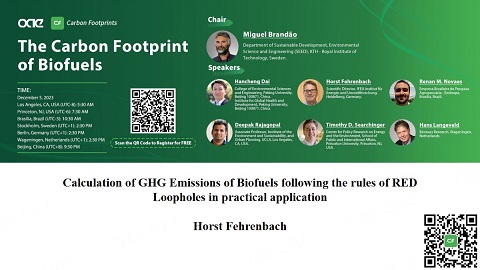
Horst Fehrenbach
Presentation: Calculation of GHG Emissions of Biofuels Following the Rules of RED – Loopholes in Practical Application
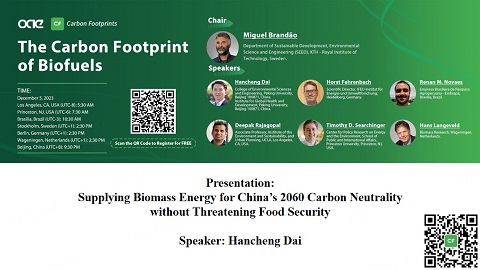
Hancheng Dai
Presentation: Supplying Biomass Energy for China’s 2060 Carbon Neutrality without Threatening Food Security
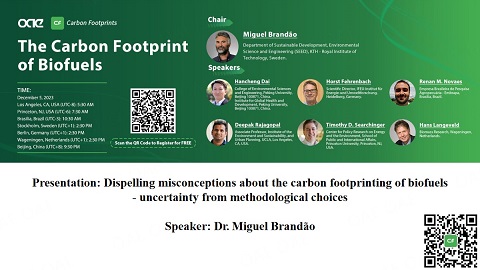
Miguel Brandão
Presentation: Dispelling misconceptions about the carbon footprinting of biofuels
- uncertainty from methodological choices
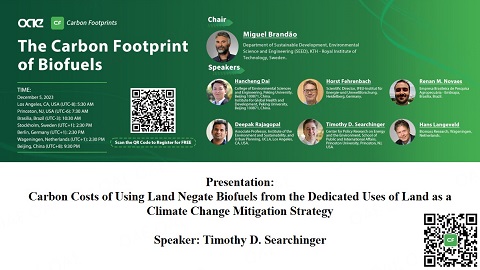
Timothy D. Searchinger
Presentation: Carbon Costs of Using Land Negate Biofuels from the Dedicated Uses of Land as a Climate Change Mitigation Strategy
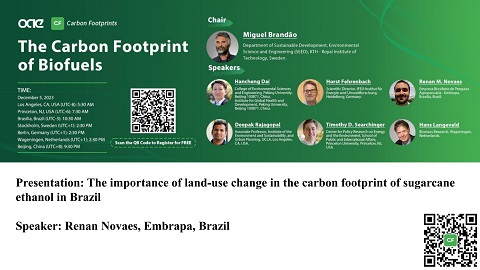
Renan M. Novaes
Presentation: The importance of land-use change in the carbon footprint of sugarcane ethanol in Brazil
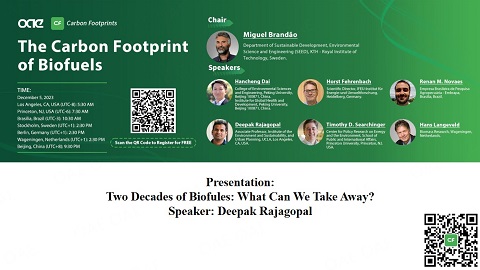
Deepak Rajagopal
Presentation: Two Decades of Biofules: What Can We Take Away?
